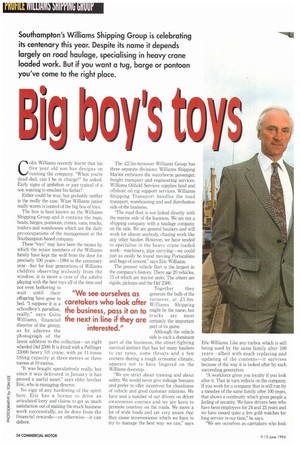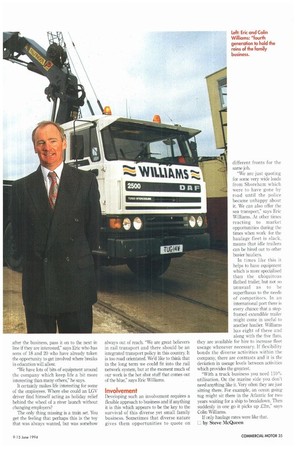Big bo
Page 38

Page 39

If you've noticed an error in this article please click here to report it so we can fix it.
Southampton's Williams Shipping Group is celebrating its centenary this year. Despite its name it depends largely on road haulage, specialising in heavy crane loaded work. But if you want a tug, barge or pontoon you've come to the right place.
Colin Williams recently learnt that his five year old son has designs on running the company. "When you're dead dad, can I be in charge?" he asked. Early signs of ambition or just typical of a son wanting to emulate his father?
Either could be true, but probably neither is the really the case. What Williams junior really wants is control of the big box of toys.
The box is best known as the Williams Shipping Group and it contains the tugs, boats, barges, pontoons, cranes, vans, trucks, trailers and warehouses which are the daily pre-occupations of the management at the Southampton-based company These "toys" may have been the means by which the senior members of the Williams family have kept the wolf from the door for precisely 100 years-1994 is the centenary year—but for four generations of Williams children observing jealously from the window, it is more a case of the adults playing with the best toys all of the time and not even bothering to wait until their offspring have gone to bed. "I suppose it is a schoolboy's paradise, really," says Colin Williams, financial director of the group, as he admires the photograph of the latest addition to the collection—an eight wheeled Daf 2500. It is fitted with a Palfinger 33000 heavy lift crane, with an 11-tonne lifting capacity at three metres or three tonnes at 10 metres.
"It was bought speculatively really, but since it was delivered in January it has proved a useful asset," says elder brother Eric, who is managing director.
No sign of any hardening of the spirit here. Eric has a licence to drive an articulated lorry and claims to get as much satisfaction out of making the truck business work successfully, as he does from the financial rewards—or otherwise—it can deliver. The £2.5m-turnover Williams Group has three separate divisions: Williams Shipping Marine embraces the waterborne passenger, freight transport and engineering services. Williams Oilfield Services supplies land and offshore oil rig support services. Williams Shipping Transport handles the road transport, warehousing and and distribution side of the business.
"The road fleet is not linked directly with the marine side of the business. We are not a shipping company with a haulage company on the side. We are general hauliers and will work for almost anybody, chasing work like any other haulier. However, we have tended to specialise in the heavy crane loaded work—machinery, pipe carrying—we could just as easily be found moving Portacabins and bags of cement," says Eric Williams.
The present vehicle fleet is the largest in the company's history. There are 20 vehicles, 13 of which are tractor units. The others are rigids, pickups and the Daf 2500.
Together they generate the bulk of the turnover, at .£1.5m. Williams Shipping might be the name, but trucks are most certainly the important part of its game.
Although the vehicle side is such a dominant part of the business, the street-fighting survival instinct that has led many hauliers to cut rates, some throats and a few corners during a tough economic climate, appears not to have lingered on the Williams doorstep.
"We are strict about training and about safety. We would never give mileage bonuses and prefer to offer incentives for cleanliness of vehicle and good customer relations. We have sent a number of our drivers on driver awarenesss courses and we are keen to promote courtesy on the roads. We move a lot of wide loads and are very aware that they cause inconvenience which we have to try to manage the best way we can," says Eric Williams. Like any toybox which is still being used by the same family after 100 years—albeit with much replacing and updating of the contents—it survives because of the way it is looked after by each succeeding generation.
"A workforce gives you loyalty if you look after it. That in turn reflects on the company. If you work for a company that is still run by a member of the same family after 100 years, that shows a continuity which gives people a feeling of security. We have drivers here Who have been employees for 24 and 23 years and we have issued quite a few gold watches for long service in our time," he says.
"We see ourselves as caretakers who look after the business, pass it on to the next in line if they are interested," says Eric who has sons of 18 and 20 who have already taken the opportunity to get involved where breaks in education will allow.
"We have lots of bits of equipment around the company which keep life a bit more interesting than many others," he says.
It certainly makes life interesting for some of the employees. Where else could an WV driver find himself acting as holiday relief behind the wheel of a river launch without changing employers?
The only thing missing is a train set. You get the feeling that perhaps this is the toy that was always wanted, but was somehow always out of reach. "We are great believers in rail transport and there should be an integrated transport policy in this country. It is too road orientated. We'd like to think that in the long term we could fit into the rail network system, but at the moment much of our work is the hot shot stuff that comes out of the blue," says Eric Williams.
Involvement
Developing such an involvement requires a flexible approach to business and if anything it is this which appears to be the key to the survival of this diverse yet small family business. Sometimes that diverse nature gives them opportunities to quote on different fronts for the same job.
"We are just quoting for some very wide loads from Shoreham which were to have gone by road until the police became unhappy about it. We can also offer the sea transport," says Eric Williams. At other times reacting to market opportunities during the times when work for the haulage fleet is slack, means that idle trailers can be hired out to other busier hauliers.
In times like this it helps to have equipment which is more specialised than the ubiquitous flatbed trailer, but not so unusual as to be superfluous to the needs of competitors. In an international port there is every chance that a stepframed extendible trailer might come in useful to another haulier. Williams has eight of these and along with the five fiats, they are available for hire to increase fleet useage whenever necessary. If flexibility bonds the diverse activities within the company, there are contrasts and it is the deviation in useage levels between activities which provides the greatest.
"With a truck business you need 110% utilisation. On the marine side you don't need anything like it. Very often they are just sitting there. For example, an ocean going tug might sit there in the Atlantic for two years waiting for a ship to breakdown. Then suddenly in one go it picks up L2m," says Cohn Williams.
If only haulage rates were like that.
Li by Steve McQueen




























































































